Overview
The reconsideration process serves as a formal request to review a government agency's decision on benefits eligibility. This step is especially crucial for those whose initial applications have been denied. We understand that this can be a challenging time, and it’s vital for applicants to present new evidence or clarify any misunderstandings. Statistics show that a significant percentage of those who pursue reconsideration can successfully advance their claims, especially when guided properly.
You are not alone in this journey. Many individuals face similar hurdles, and it's common to feel overwhelmed. However, this stage offers a valuable opportunity to strengthen your case. Remember, with the right support, you can navigate this process more effectively.
We’re here to help you through each step. By taking the time to gather new information and seek assistance, you can increase your chances of a favorable outcome. Don't hesitate to reach out for guidance—together, we can work towards a brighter future.
Introduction
Understanding the reconsideration process is essential for anyone navigating the often daunting landscape of benefits eligibility, especially in the realm of Social Security Disability. We understand that this formal procedure can feel overwhelming. It not only allows individuals to contest unfavorable decisions but also provides a vital opportunity to present new evidence or clarify misunderstandings that may have led to a denial.
It's common to feel discouraged when faced with challenges. Statistics reveal that many applicants encounter significant obstacles during this journey. So, how can you effectively leverage this process to ensure your voice is heard and your rights are upheld? Remember, you are not alone in this journey. We’re here to help.
Define Reconsideration: Understanding the Term
The reconsideration definition highlights it as a vital process that allows individuals to formally request a review of a government agency's decision regarding benefits eligibility or entitlement. If your initial application has been denied, this step is particularly important. It gives you the opportunity to submit additional evidence or clarify any misunderstandings that may have contributed to the unfavorable outcome. In the realm of disability benefits, the reconsideration definition plays a crucial role in ensuring that applicants receive the support they truly deserve.
At Turnout, we provide access to tools and services that simplify this process. Our trained nonlegal advocates are here to help you navigate the complexities of Social Security Disability (SSD) claims. We understand that it can be overwhelming, but you're not alone in this journey. Statistics show that roughly 53% of individuals who contest a first denial for Social Security Disability Insurance (SSDI) are eventually accepted. Additionally, about half of the applicants who meet technical criteria and challenge their initial decisions find success at some stage in the process.
It's common to feel uncertain during this time. Appeals for review represent approximately 2% of SSDI awards, while 7% of cases receive approval at the hearing stage. Significantly, 77% of candidates at the reconsideration definition stage advance to the next round, highlighting the potential for success when you have expert guidance.
Importantly, Turnout is not a law firm and does not provide legal advice. We want to ensure that you fully understand the nature of the support we offer. This clarity makes us a vital component of consumer advocacy in the pursuit of disability benefits. Remember, we’re here to help you every step of the way.
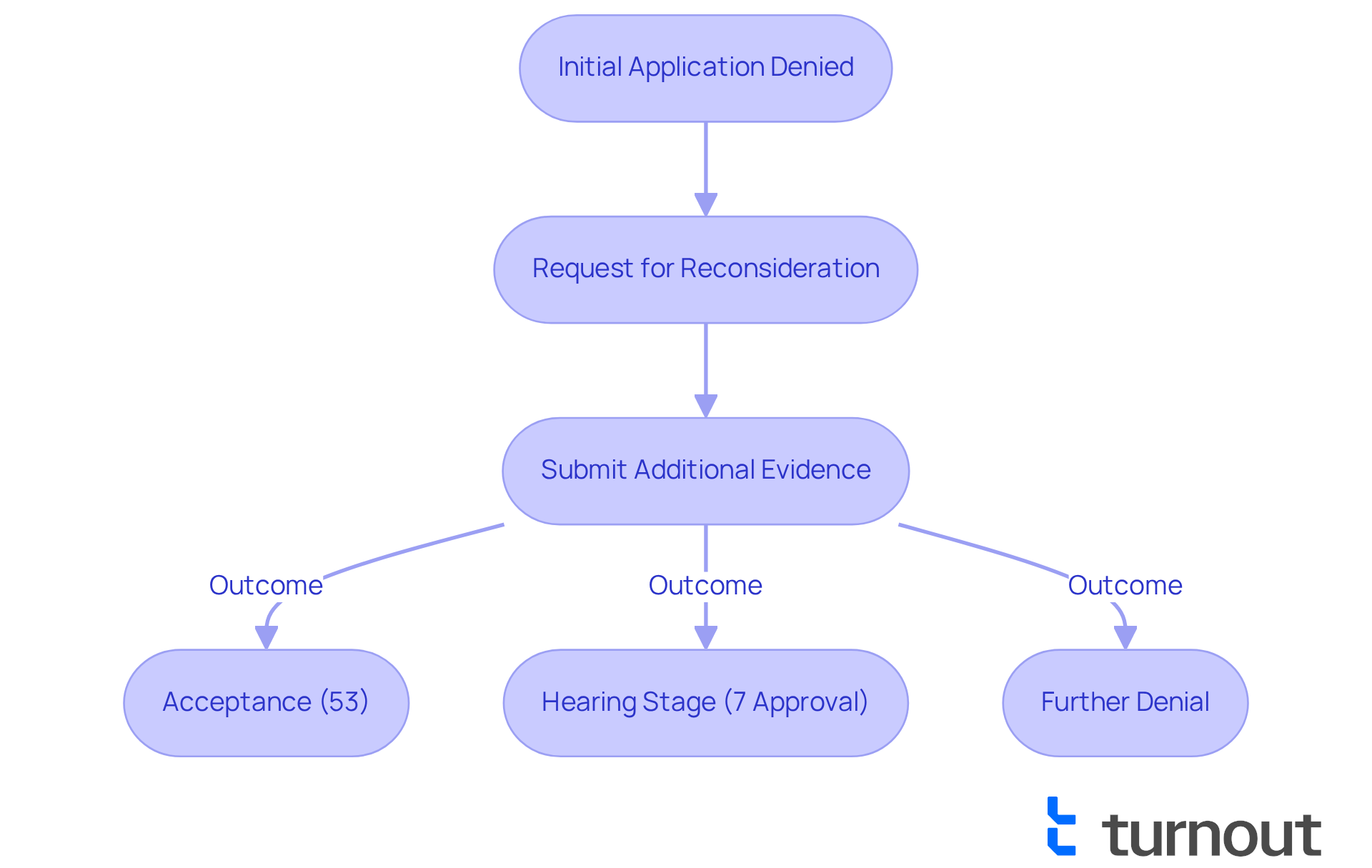
Contextualize Reconsideration: Legal and Procedural Importance
Reconsideration is a vital step in the legal framework surrounding benefits applications. For many, especially those navigating the complexities of Social Security Disability (SSD) claims, this can feel overwhelming. We understand that it’s common to face challenges in this process. Reconsideration definition often serves as the first stage in the appeals procedure, allowing individuals to contest decisions made by organizations like the Social Security Administration.
At Turnout, we want to clarify that we are not a law firm and do not provide legal advice. Instead, we simplify this journey by connecting you with trained nonlawyer advocates. These advocates can assist you in presenting new evidence or clarifying existing information. This organized support empowers individuals, acting as a safeguard against arbitrary decision-making. It ensures that all relevant factors are considered before a final determination is made.
Grasping this context is crucial for those aiming to navigate the intricacies of benefits applications efficiently. Remember, you are not alone in this journey. By seeking assistance, you are taking an important step toward ensuring your voice is heard in the process.
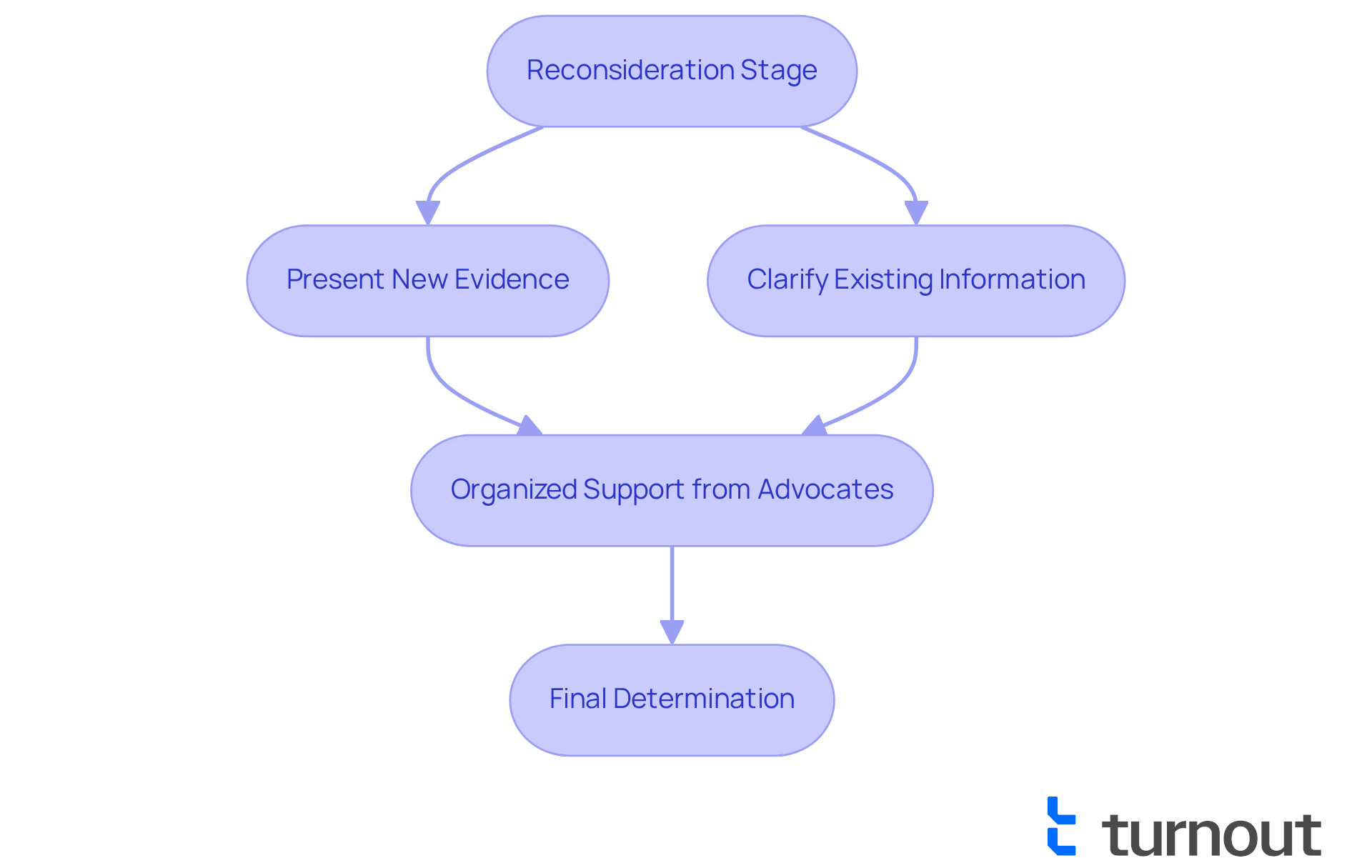
Trace the Origins of Reconsideration: Historical Development
The concept of reevaluation stems from the broader evolution of administrative regulations and consumer rights. We understand that navigating complex bureaucratic systems can feel overwhelming, often leading to unjust outcomes. Over time, various legislative reforms have aimed to simplify the reconsideration definition process, making it more accessible and transparent for those in need. This evolution reflects a growing recognition of the importance of consumer advocacy in ensuring fair treatment within government systems.
In this context, Turnout plays a vital role. We offer digital tools, including a guided platform and case support, to help you navigate these complexities. Through our AI assistant, Jake, we empower you to understand your rights and the review process, ensuring you have the resources necessary to assert your claims effectively.
By exploring the roots of reassessment, we can appreciate its significance as a crucial resource for individuals like you, striving to navigate the often challenging landscape of benefits applications, especially in relation to the reconsideration definition. Remember, Turnout is here to provide essential support throughout this journey. You are not alone in this process.
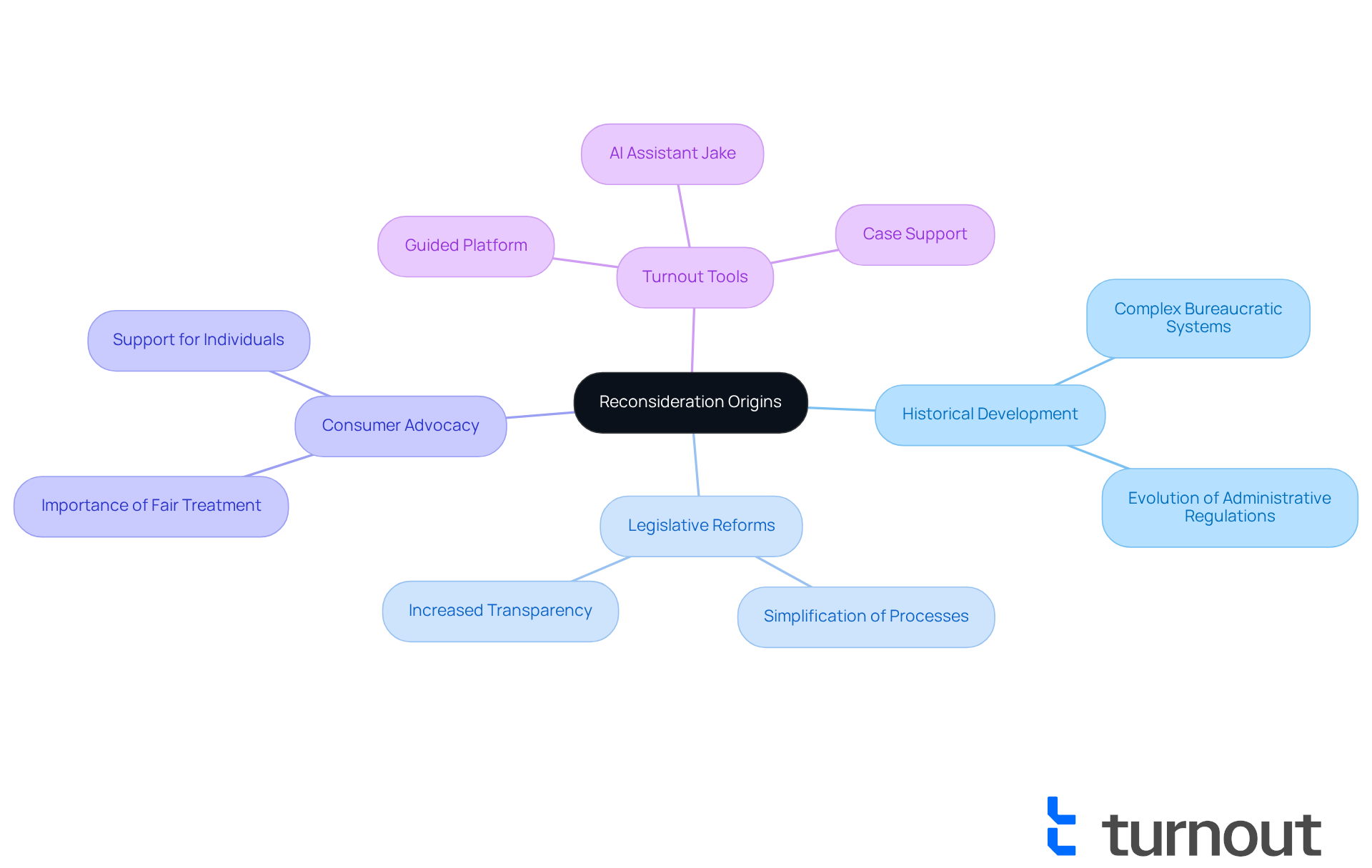
Identify Key Characteristics of Reconsideration: Components and Applications
Navigating the review procedure can feel overwhelming, but understanding its essential features can empower you. Key aspects include:
- Presenting new evidence
- Adhering to timelines
- Making a formal request
Typically, applicants should submit their review request within a specified timeframe after the initial decision, often including documentation that addresses the reasons for denial.
It's important to know that your review may be assessed by a different group of officials than those who made the original decision. This ensures an impartial evaluation, giving you a fair chance to present your case. We understand that this process can be daunting, but knowing these elements can help you articulate your argument in an organized way, enhancing your chances of a positive outcome.
At Turnout, we're here to help. Our trained non-legal advocates are ready to guide you through this situation, including assistance with tax debt relief services. You are not alone in this journey; we provide the comprehensive support you need to increase your chances of success.
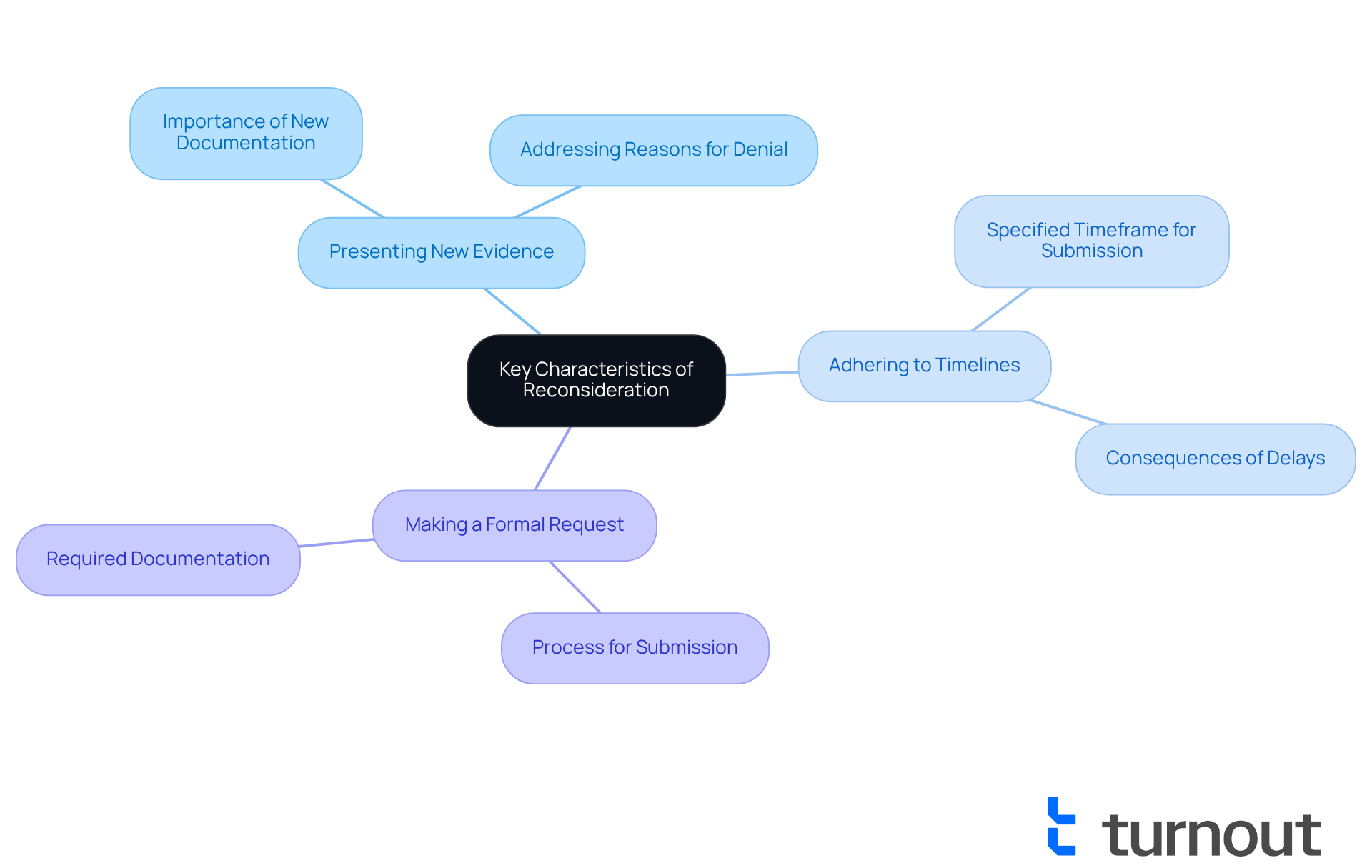
Practical Implications of Reconsideration: Navigating the Process
Navigating the review procedure can feel overwhelming, but we understand that with careful attention to detail and a proactive approach, you can make a difference. Start by thoroughly reviewing the denial letter; this will help you grasp the specific reasons behind the decision. Gathering additional evidence—like medical records or expert opinions—can significantly strengthen your case for the reconsideration definition.
It's also vital to adhere to all deadlines and procedural requirements. Missing these can lead to unnecessary delays, which can be frustrating. Remember, you are not alone in this journey. Engaging with Turnout can provide valuable support throughout this process, ensuring that you are well-informed and prepared to advocate for your rights effectively.
Turnout offers a range of services, including assistance with Social Security Disability claims and tax debt relief. Some of these services are free, while others may involve service fees, separate from any government fees that might apply. By understanding these fees and the nature of the assistance provided—without legal representation—you can enhance your chances of achieving a favorable outcome in your pursuit of benefits.
We’re here to help you every step of the way.
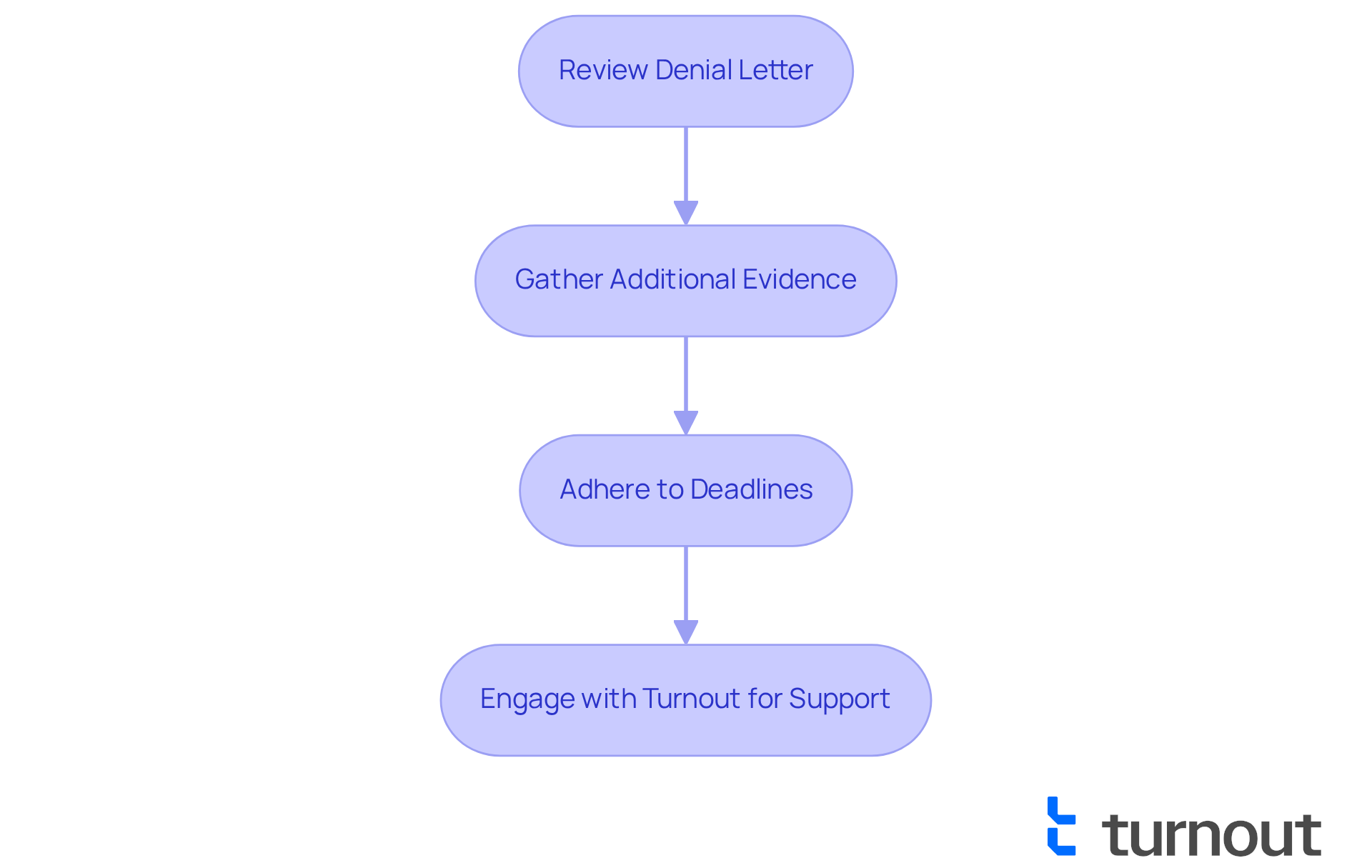
Conclusion
Reconsideration serves as a pivotal mechanism in the landscape of benefits applications, granting individuals the opportunity to challenge unfavorable decisions made by government agencies. This process is essential for those seeking Social Security Disability benefits, allowing them to present new evidence and correct misunderstandings that may have led to a denial. We understand that navigating this critical stage can be daunting, but by grasping the definition of reconsideration, applicants can approach it with greater confidence and clarity.
Throughout this article, we highlight key insights that reveal the importance of reconsideration in the legal and procedural context. It underscores the necessity of timely action, the submission of relevant evidence, and the potential for a favorable outcome when engaging with trained advocates. It's common to feel overwhelmed, but statistics show that a significant percentage of applicants who pursue reconsideration successfully advance in the process. This emphasizes the value of expert guidance in overcoming barriers to benefits.
Ultimately, the reconsideration process is not just a procedural formality; it represents a vital opportunity for individuals to assert their rights and ensure fair treatment within the benefits system. Engaging with resources like Turnout can provide essential support, empowering applicants to navigate the complexities of their claims effectively. By taking proactive steps and seeking assistance, individuals can enhance their chances of achieving the benefits they deserve. Remember, you are not alone in this journey, and understanding and utilizing the reconsideration process is crucial.
Frequently Asked Questions
What is the definition of reconsideration in the context of government benefits?
Reconsideration is a formal process that allows individuals to request a review of a government agency's decision regarding their benefits eligibility or entitlement, especially after an initial application has been denied.
Why is reconsideration important for disability benefits applicants?
Reconsideration is crucial because it provides applicants the opportunity to submit additional evidence or clarify misunderstandings that may have led to an unfavorable decision, ensuring they receive the support they deserve.
What percentage of individuals contesting a first denial for Social Security Disability Insurance (SSDI) are eventually accepted?
Approximately 53% of individuals who contest a first denial for SSDI are eventually accepted.
How successful are applicants who challenge their initial decisions regarding disability benefits?
About half of the applicants who meet technical criteria and challenge their initial decisions find success at some stage in the process.
What are the statistics regarding appeals for review and approvals at different stages?
Appeals for review represent approximately 2% of SSDI awards, while 7% of cases receive approval at the hearing stage. Notably, 77% of candidates at the reconsideration stage advance to the next round.
What role does Turnout play in the reconsideration process?
Turnout provides access to tools and services that simplify the reconsideration process by connecting individuals with trained nonlegal advocates who can assist in presenting new evidence or clarifying existing information.
Does Turnout provide legal advice?
No, Turnout is not a law firm and does not provide legal advice; it focuses on consumer advocacy and support in the pursuit of disability benefits.
Why is it important to seek assistance during the reconsideration process?
Seeking assistance is important as it empowers individuals, helps ensure that all relevant factors are considered, and safeguards against arbitrary decision-making in the benefits application process.




